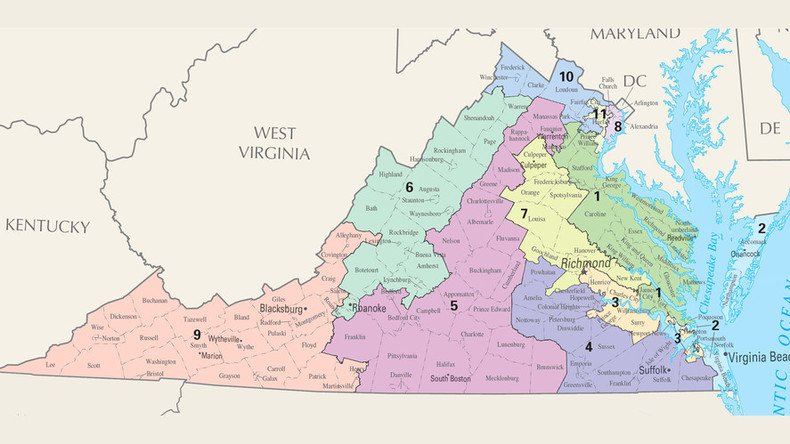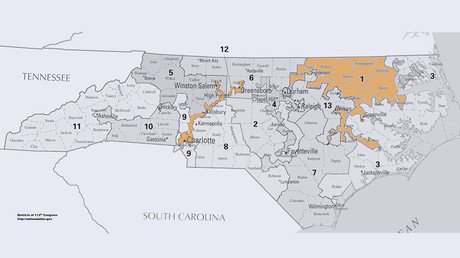Prison-based gerrymandering unconstitutional, federal judge rules

A federal judge ruled on Monday that Florida’s practice of using prison populations to manipulate voting districts is unconstitutional, perhaps foreshadowing Virginia’s Supreme Court case questioning the constitutionality of its congressional districts.
The Third District of Florida’s Jefferson County has an interesting population. Out of the entire voting age population, 43.2 percent cannot legally vote in County Commission and School Board elections, according to The American Civil Liberties Union (ACLU).
The district map for Jefferson County’s Third District was drawn to include the Jefferson Correctional Institute with its 1,157 inmates, who make up more than a third of the district’s population, the Palm Beach Post reports.
Gerrymandering, the practice of redrawing legislative district lines to gain political advantages, has become an issue of contention in both Florida and Virginia. For Florida’s Jefferson County, including the inmate population in the Third District resulted in giving eligible voters almost twice the voting power.
Supreme Court strikes blow to Arizona GOP’s gerrymandering dreams http://t.co/tk6PUQrxcUpic.twitter.com/E6GF6kIVQU
— RT America (@RT_America) June 30, 2015
Because of the additional 1,157 non-voting inmates included in the Third District’s population, the amount of power that other districts – and local populations – have in local politics is diluted. The ACLU’s attorney, Nancy Abudu, told ThinkProgress, “It’s about access and the ability to influence, and making sure officials are responsive to their electorate.”
However, a federal judge in Florida’s Northern District has ruled that prison-based gerrymandering is a violation of the “one person, one vote” principle under the Equal Protection Clause of Fourteenth Amendment of the US Constitution. The County has until April 4 to redraw congressional district lines before the June qualifying election for commissioners and school board members. If it fails to do so, the court will impose its own interim plan.
Although this is the first federal ruling on gerrymandering, it won’t be the last. Virginia Republicans are taking their case to the Supreme Court this week to refute accusations of racial gerrymandering.
According to the US Census, African-Americans made up 19.7 percent of Virginia’s population in 2014. Yet, there is just a single African-American congressman from the Commonwealth out of 11 representatives – Representative Robert C. Scott (D). The Supreme Court will consider whether Virginia’s Republican lawmakers packed African-American voters into Scott’s district to protect him in order to comply with the Voting Rights Act or, rather, to keep the surrounding districts more friendly towards whites, the Washington Post reports.
“In Virginia, state legislators redraw district lines for the US Congress, the Virginia House of Delegates and the Senate of Virginia after every 10-year census,” explains OneVirginia2021, a group dedicated to fair redistricting. “Under the current system, the party in power in the House and the party in power in the Senate can draw the lines to serve their own interests, not those of our communities.”
Many Virginians agree. The Washington Post found that, in 2013, 74 percent of state residents thought an independent board – not the state legislature – should be responsible for drawing the various legislative and congressional districts.
The state’s Republicans have a different opinion, however, instead, comparing the determination of congressional district lines to Goldilocks figuring out which porridge to eat, as former Virginia delegate Bill Janis (R-Glen Allen), who devised the commonwealth’s congressional map, explained to the Washington Post.
“You can’t let the porridge be too hot, you can’t let the porridge be too cold,” Janis said. “But they won’t tell us what temperature the porridge has to be.”
The Supreme Court’s decision could mean big changes for the Commonwealth of Virginia. With over 75 percent of the redistricting plans being challenged in court, high stakes are at play.
Alabama’s legislative districts are ‘racially gerrymandered,' Supreme Court rules http://t.co/lnvtCZotsXpic.twitter.com/yLXVkrBLb0
— RT (@RT_com) March 26, 2015













